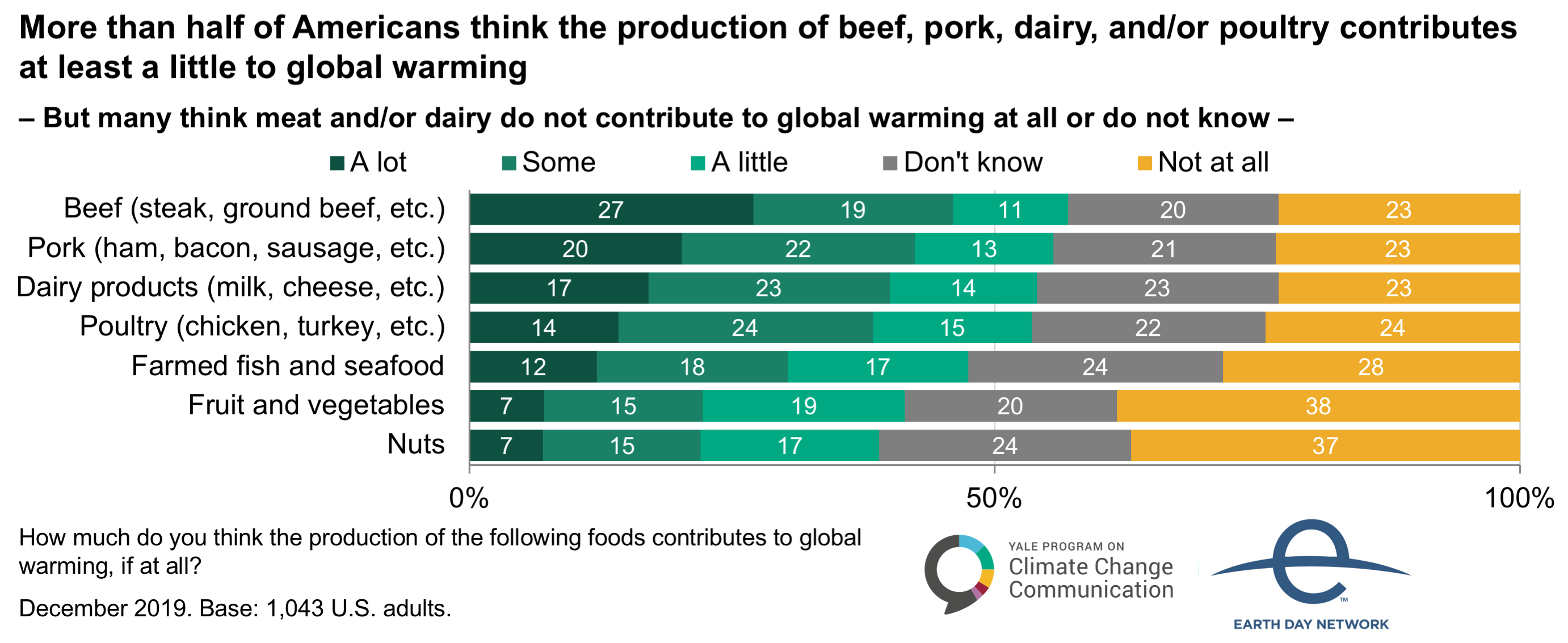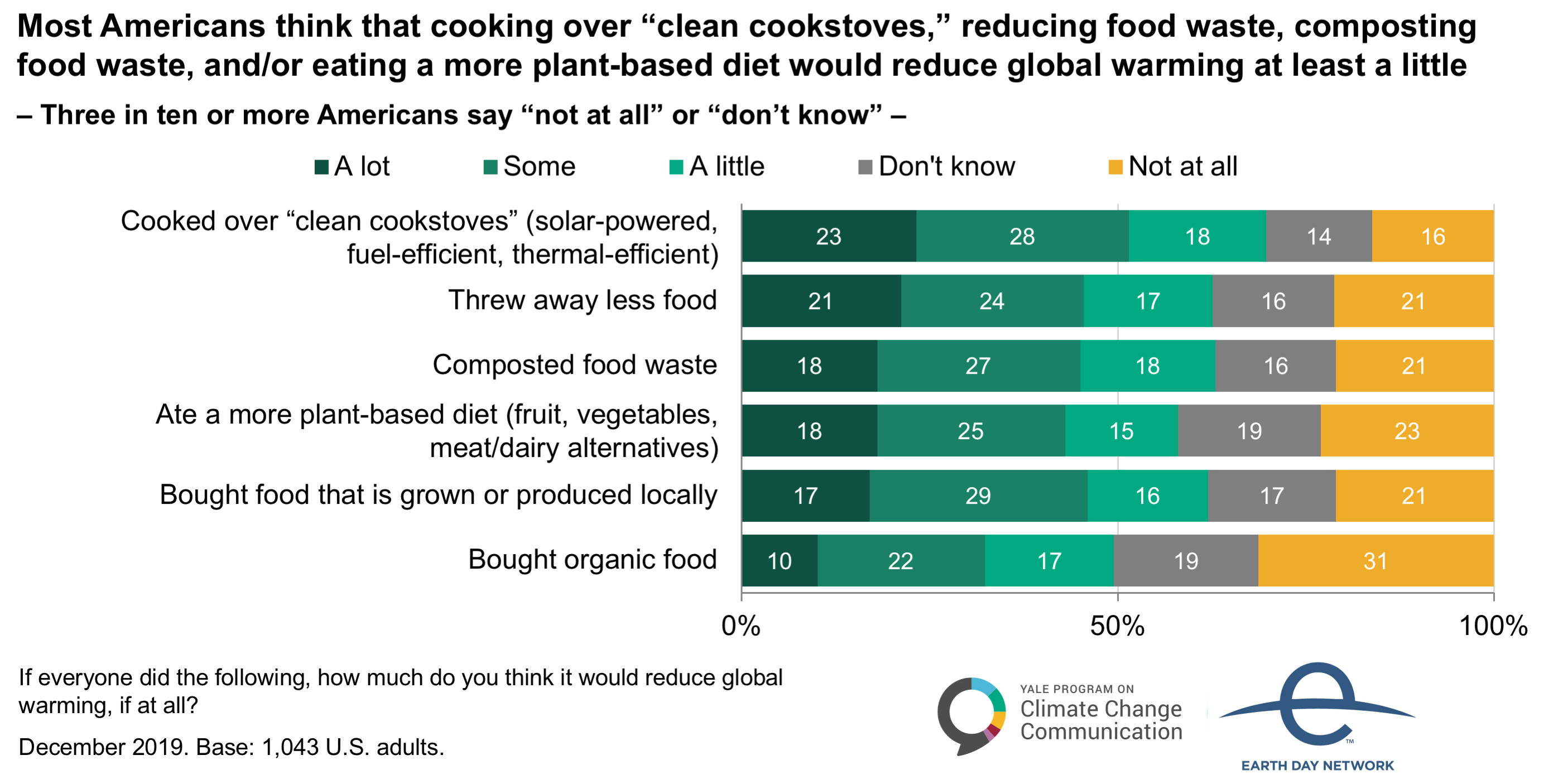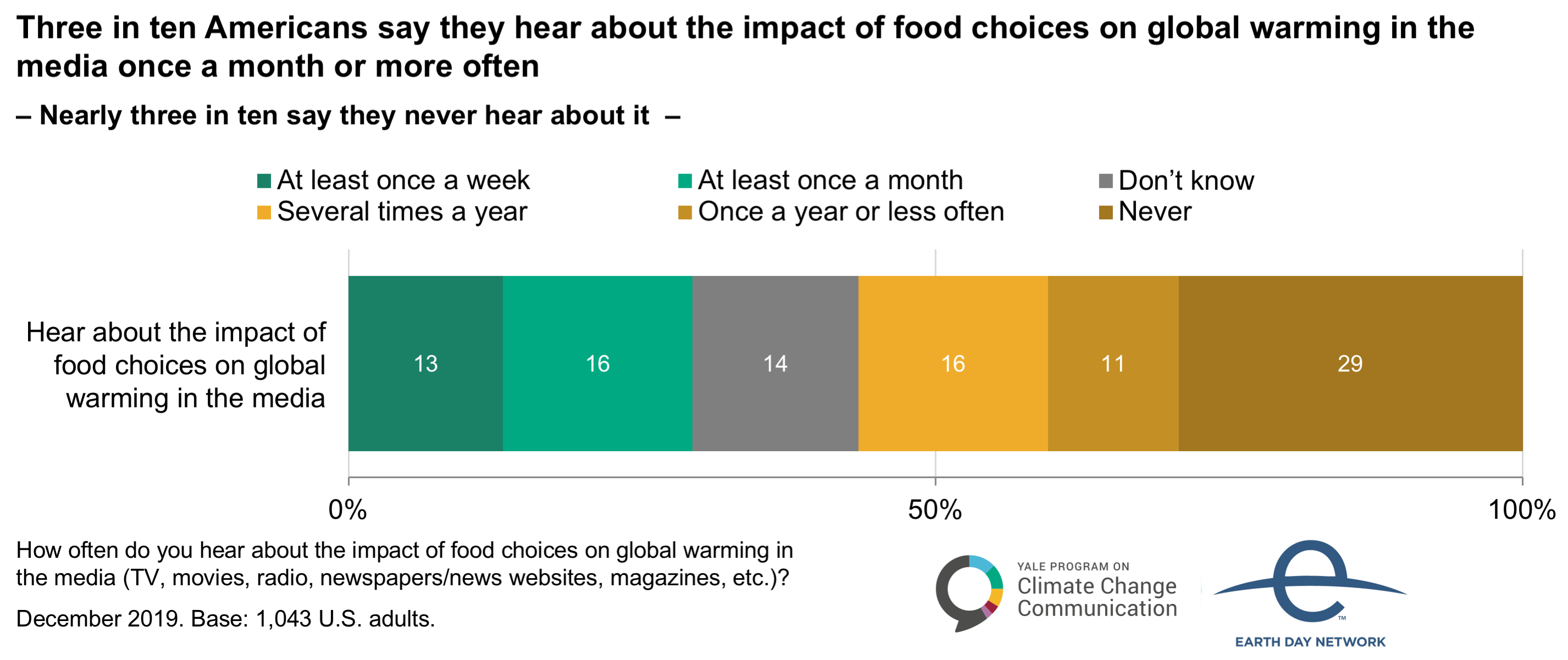Report · Feb 13, 2020
Climate Change and the American Diet
By Anthony Leiserowitz, Matthew Ballew, Seth Rosenthal and Jillian Semaan
5. Awareness of Food's Connection to Global Warming
5.1. More than half of Americans think the production of beef, pork, dairy, and/or poultry contributes at least a little to global warming.
Food production generates up to 30% of total greenhouse gas emissions globally.https://www.ipcc.ch/site/assets/uploads/2018/02/ipcc_wg3_ar5_chapter11.pdf,Vermeulen, S. J., Campbell, B. M., & Ingram, J. S. (2012). Climate change and food systems. Annual Review of Environment and Resources, 37, 195-222. doi: 10.1146/annurev-environ-020411-130608 Food production is also a significant contributor to biodiversity loss, deforestation, freshwater use, and land-use change.Willett, W., Rockström, J., Loken, B., Springmann, M., Lang, T., Vermeulen, S., … & Jonell, M. (2019). Food in the Anthropocene: The EAT–Lancet Commission on healthy diets from sustainable food systems. The Lancet, 393(10170), 447-492. doi: 10.1016/S0140-6736(18)31788-4 The production of livestock primarily raised for beef and dairy generates the most greenhouse gas emissions compared to other foods.Vermeulen, S. J., Campbell, B. M., & Ingram, J. S. (2012). Climate change and food systems. Annual Review of Environment and Resources, 37, 195-222. doi: 10.1146/annurev-environ-020411-130608,Willett, W., Rockström, J., Loken, B., Springmann, M., Lang, T., Vermeulen, S., … & Jonell, M. (2019). Food in the Anthropocene: The EAT–Lancet Commission on healthy diets from sustainable food systems. The Lancet, 393(10170), 447-492. doi: 10.1016/S0140-6736(18)31788-4 ,http://www.fao.org/3/i3437e/i3437e.pdf,Poore, J., & Nemecek, T. (2018). Reducing food’s environmental impacts through producers and consumers. Science, 360(6392), 987-992. doi: 10.1126/science.aaq0216 According to the Food and Agriculture Organization of the United Nations, the production of livestock accounts for 14.5% of greenhouse gas emissions around the globe.http://www.fao.org/3/i3437e/i3437e.pdf The production of beef, lamb, and dairy, as well as farm-raised crustaceans (e.g., shrimp, crab, lobster), tend to generate the highest greenhouse gas emissions per gram of protein compared to other food products, including pork and poultry, whereas plant-based foods (e.g., fruit, vegetables, nuts) tend to produce the lowest emissions.Poore, J., & Nemecek, T. (2018). Reducing food’s environmental impacts through producers and consumers. Science, 360(6392), 987-992. doi: 10.1126/science.aaq0216
More than half of Americans think beef, pork, dairy, and/or poultry contribute at least “a little” to global warming. However, only about one in four Americans (27%) think that the production of beef contributes “a lot” to global warming, and one in five (20%) think the same about the production of pork. Fewer Americans think the production of dairy (17%), poultry (14%), and/or farmed fish and seafood (12%) contribute “a lot” to global warming. Americans are less likely to think that fruit and vegetables, and/or nuts contribute to global warming; nearly four in ten Americans think fruit and vegetables (38%), and/or nuts (37%) do not contribute at all.
More than one in five Americans do not think that the production of meat (e.g., beef, pork, farmed fish and seafood) and/or dairy contributes at all to global warming, and more than one in five, on average, do not know. These results indicate that many Americans are unaware of agriculture’s contribution to global warming.
5.2. Most Americans think that cooking over “clean cookstoves,” reducing food waste, composting food waste, and/or eating a more plant-based diet would reduce global warming at least a little.
Changing food production and consumption systems globally could greatly reduce their environmental impacts and the emissions that cause global warming.Willett, W., Rockström, J., Loken, B., Springmann, M., Lang, T., Vermeulen, S., … & Jonell, M. (2019). Food in the Anthropocene: The EAT–Lancet Commission on healthy diets from sustainable food systems. The Lancet, 393(10170), 447-492. doi: 10.1016/S0140-6736(18)31788-4 Research finds that out of 80 global warming solutions, decreasing food waste is ranked third, and shifting to a diet rich in plant-based foods ranks fourth.https://www.drawdown.org/solutions/food Compared to other diets, vegetarian and vegan diets have been linked to the greatest reductions in greenhouse gas emissions.Peters, C. J., Picardy, J., Wilkins, J. L., Griffin, T. S., Fick, G. W., & Darrouzet-Nardi, A. F. (2016). Carrying capacity of US agricultural land: Ten diet scenarios. Elementa: Science of the Anthropocene, 4(1), 1-15. doi: 10.12952/journal.elementa.000116,Tilman, D., & Clark, M. (2014). Global diets link environmental sustainability and human health. Nature, 515(7528), 518-522. doi: 10.1038/nature13959 Two other food-related behavioral solutions include cooking over “clean cookstoves” (e.g., solar-powered, fuel-efficient, thermal-efficient; ranked 21st) and composting food waste (ranked 60th).https://www.drawdown.org/solutions/food
Most Americans think that if everyone adopted these food-related behaviors it would reduce global warming at least “a little.” Americans are more likely to say that cooking over clean cookstoves would reduce global warming compared to the other food-related solutions. One in five or fewer Americans think that everyone reducing food waste (21%), eating a more plant-based diet (18%), composting food waste (18%), and/or buying food that is grown or produced locally (17%) would reduce global warming “a lot.” Fewer Americans (10%) think that everyone buying organic food would reduce global warming “a lot,” and 31% say it would not reduce global warming at all.
Three in ten or more Americans say “not at all” or “don’t know” regarding each of these solutions, suggesting that many are unaware of the impact certain food-related actions, particularly reducing food waste and eating more plant-based foods, can have on global warming.
5.3. Three in ten Americans say they hear about the impact of food choices on global warming in the media once a month or more often.
Three in ten Americans say they hear about the impact of food choices on global warming in the media either “at least once a month” (16%) or “at least once a week” (13%). About one in four Americans say they hear about it in the media only “several times a year” (16%) or “once a year or less often” (11%), and 29% say they “never” hear about it.


